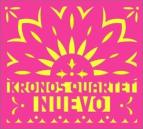Kronos Quartet
Nonesuch, 2002
Duration:

I am not sure what to think of this album... or of the Kronos Quartet itself for that matter. If there is a group out there that defies classifications, this must be it. The Europe Jazz Network publishes a short description of the group, and many people appear to consider them somehow "jazzy". However, Amazon filed them under the "Classical Music" category, and they as soon play contemporary composers such as Shostakovich, John Cage or Philip Glass than turn to popular music like they do in the case of this album we are reviewing here. In all cases, the only common denominator appears to be the "fearless dedication to experimentation" mentioned by the Europe Jazz Network.
So, what about Nuevo? The album is entirely based on Mexican composers and traditional music in what appears to be a research by the string quartet in Mexican folk music. As such, one has the impression that Nuevo mixes innovation with very traditional forms in a somehow unfinished manner. For example, El Sinaloense, which opens the album, is a traditional mariachi piece that at times sounds quite strident and out of tune due to the particular way it was recorded. It nearly appears as if the strings are going to pop out any time, reminding me of certain Jimi Hendrix pieces where the rock idol was pushing the instrument so far that it came across nearly as noise (who does not remember his rendition of the American anthem, which some see as example of genius and others as an affront?). They do manage nevertheless to provide a more "popular" air to the music, nearly as if we are listening to the piece in some Mexican square during the local celebrations of a remote rural village. In that sense, the CD has authenticity and it definitely is more accessible to the regular listener than most other albums recorded by the Kronos Quartet. Se me hizo fácil, composed by Agustín Lara, is a far more classical sounding piece, playful and light. Mini-skirt, composed by Juan García Esquivel, is a piece of lounge music that brings us back to the sort of kitsch we hear in the good 1950s oldies. In summary, Nuevo is an original mixture of Mexican popular music (El llorar, El Sinaloense...) together with more classical themes (Perfidia, by Alberto Domínguez), pieces of experimental contemporary music (Sensemaya, composed by Silvestre Revueltas, Cuatro Milpas, by José Jesús Belisario García de Elizondo), others clearly inspired by TV and pop culture (Chavosuite, by Ricardo Gallego, inspired in the TV comedy El Chavo del Ocho, and that fully conveys the childish, innocent humor of the TV hit) and, finally, some that are as unclassifiable as the album itself (12/12, by Café Tacuba).
Altogether, Nuevo is not a masterpiece but it should be interesting to anyone who wants to find out what music is being made to the South of the Río Grande these days, beyond the always present mariachi and other stereotypes.
Entertainment factor: 5/10
Artistic factor: 7/10